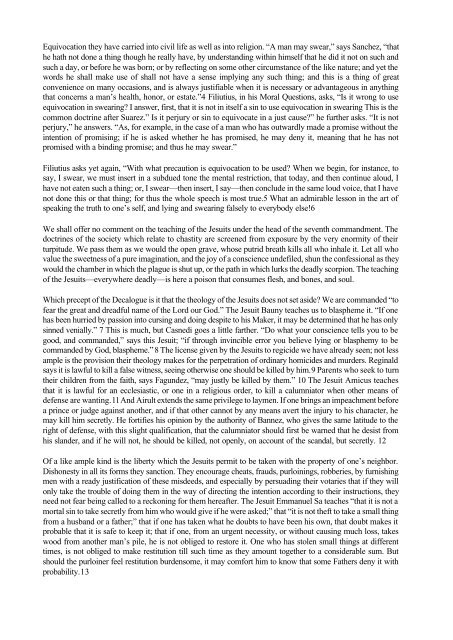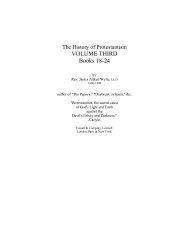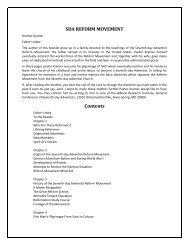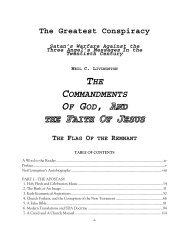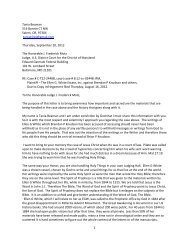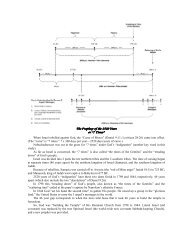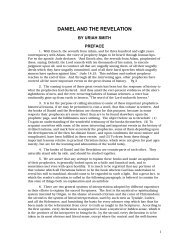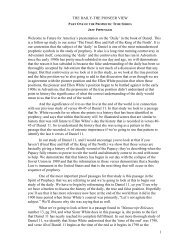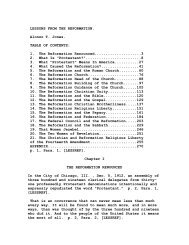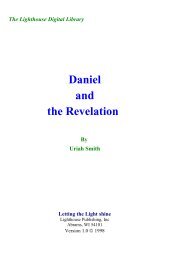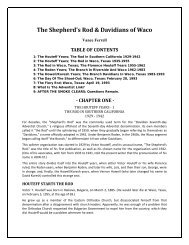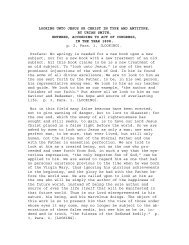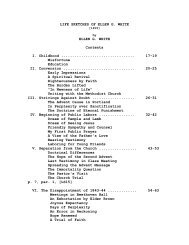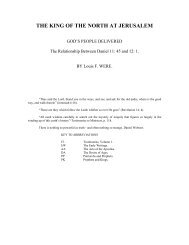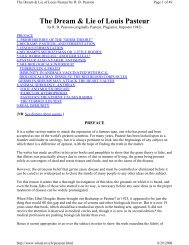History of Jesuits
History of Jesuits
History of Jesuits
Create successful ePaper yourself
Turn your PDF publications into a flip-book with our unique Google optimized e-Paper software.
Equivocation they have carried into civil life as well as into religion. “A man may swear,” says Sanchez, “that<br />
he hath not done a thing though he really have, by understanding within himself that he did it not on such and<br />
such a day, or before he was born; or by reflecting on some other circumstance <strong>of</strong> the like nature; and yet the<br />
words he shall make use <strong>of</strong> shall not have a sense implying any such thing; and this is a thing <strong>of</strong> great<br />
convenience on many occasions, and is always justifiable when it is necessary or advantageous in anything<br />
that concerns a man’s health, honor, or estate.”4 Filiutius, in his Moral Questions, asks, “Is it wrong to use<br />
equivocation in swearing? I answer, first, that it is not in itself a sin to use equivocation in swearing This is the<br />
common doctrine after Suarez.” Is it perjury or sin to equivocate in a just cause?” he further asks. “It is not<br />
perjury,” he answers. “As, for example, in the case <strong>of</strong> a man who has outwardly made a promise without the<br />
intention <strong>of</strong> promising; if he is asked whether he has promised, he may deny it, meaning that he has not<br />
promised with a binding promise; and thus he may swear.”<br />
Filiutius asks yet again, “With what precaution is equivocation to be used? When we begin, for instance, to<br />
say, I swear, we must insert in a subdued tone the mental restriction, that today, and then continue aloud, I<br />
have not eaten such a thing; or, I swear—then insert, I say—then conclude in the same loud voice, that I have<br />
not done this or that thing; for thus the whole speech is most true.5 What an admirable lesson in the art <strong>of</strong><br />
speaking the truth to one’s self, and lying and swearing falsely to everybody else!6<br />
We shall <strong>of</strong>fer no comment on the teaching <strong>of</strong> the <strong>Jesuits</strong> under the head <strong>of</strong> the seventh commandment. The<br />
doctrines <strong>of</strong> the society which relate to chastity are screened from exposure by the very enormity <strong>of</strong> their<br />
turpitude. We pass them as we would the open grave, whose putrid breath kills all who inhale it. Let all who<br />
value the sweetness <strong>of</strong> a pure imagination, and the joy <strong>of</strong> a conscience undefiled, shun the confessional as they<br />
would the chamber in which the plague is shut up, or the path in which lurks the deadly scorpion. The teaching<br />
<strong>of</strong> the <strong>Jesuits</strong>—everywhere deadly—is here a poison that consumes flesh, and bones, and soul.<br />
Which precept <strong>of</strong> the Decalogue is it that the theology <strong>of</strong> the <strong>Jesuits</strong> does not set aside? We are commanded “to<br />
fear the great and dreadful name <strong>of</strong> the Lord our God.” The Jesuit Bauny teaches us to blaspheme it. “If one<br />
has been hurried by passion into cursing and doing despite to his Maker, it may be determined that he has only<br />
sinned venially.” 7 This is much, but Casnedi goes a little farther. “Do what your conscience tells you to be<br />
good, and commanded,” says this Jesuit; “if through invincible error you believe lying or blasphemy to be<br />
commanded by God, blaspheme.” 8 The license given by the <strong>Jesuits</strong> to regicide we have already seen; not less<br />
ample is the provision their theology makes for the perpetration <strong>of</strong> ordinary homicides and murders. Reginald<br />
says it is lawful to kill a false witness, seeing otherwise one should be killed by him.9 Parents who seek to turn<br />
their children from the faith, says Fagundez, “may justly be killed by them.” 10 The Jesuit Amicus teaches<br />
that it is lawful for an ecclesiastic, or one in a religious order, to kill a calumniator when other means <strong>of</strong><br />
defense are wanting.11 And Airult extends the same privilege to laymen. If one brings an impeachment before<br />
a prince or judge against another, and if that other cannot by any means avert the injury to his character, he<br />
may kill him secretly. He fortifies his opinion by the authority <strong>of</strong> Bannez, who gives the same latitude to the<br />
right <strong>of</strong> defense, with this slight qualification, that the calumniator should first be warned that he desist from<br />
his slander, and if he will not, he should be killed, not openly, on account <strong>of</strong> the scandal, but secretly. 12<br />
Of a like ample kind is the liberty which the <strong>Jesuits</strong> permit to be taken with the property <strong>of</strong> one’s neighbor.<br />
Dishonesty in all its forms they sanction. They encourage cheats, frauds, purloinings, robberies, by furnishing<br />
men with a ready justification <strong>of</strong> these misdeeds, and especially by persuading their votaries that if they will<br />
only take the trouble <strong>of</strong> doing them in the way <strong>of</strong> directing the intention according to their instructions, they<br />
need not fear being called to a reckoning for them hereafter. The Jesuit Emmanuel Sa teaches “that it is not a<br />
mortal sin to take secretly from him who would give if he were asked;” that “it is not theft to take a small thing<br />
from a husband or a father;” that if one has taken what he doubts to have been his own, that doubt makes it<br />
probable that it is safe to keep it; that if one, from an urgent necessity, or without causing much loss, takes<br />
wood from another man’s pile, he is not obliged to restore it. One who has stolen small things at different<br />
times, is not obliged to make restitution till such time as they amount together to a considerable sum. But<br />
should the purloiner feel restitution burdensome, it may comfort him to know that some Fathers deny it with<br />
probability.13


